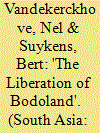|
|
|
Sort Order |
|
|
|
Items / Page
|
|
|
|
|
|
|
| Srl | Item |
| 1 |
ID:
084227


|
|
|
|
|
| Publication |
2008.
|
| Summary/Abstract |
Bodoland, located in western Assam, has been a theatre for insurgencies since the mid 1980s. Too often, migration has been the paradigmatic framework to analyse not only this, but most conflicts, raging in Assam. In this article we argue that migration in itself is insufficient to understand the problems in Bodoland. Instead, we focus on forestry and tea estates, and contend that they, forming important restrictive structures, caused tribal entrapment, finally leading to violence. Moreover, we claim that during the conflict a shift in control over these structures occurred, changing the livelihood arithmetic of the involved communities. Finally, we discuss both the restraints and opportunities of the BTC/BTAD (Bodoland Territorial Council/Bodoland Territorial Administrative District)-the result of the peace process-and warn that the escape from entrapment for the Bodo could lead to the entrapment of other communities in the area.
|
|
|
|
|
|
|
|
|
|
|
|
|
|
|
|
| 2 |
ID:
092020


|
|
|
|
|
| Publication |
2009.
|
| Summary/Abstract |
Since the 1990s, the upsurge of multiple "sons-of-the-soil" conflicts all over the world has reopened academic debate about the rise of nativism, the role of ethnicity, and the alleged crisis of citizenship within the postcolonial state. Often the renewed claim for belonging versus exclusion under the vernacular of "autochthony" is seen as a reactionary attempt to counter the de-rooting of identity within the neoliberal globalizing context. This article makes the case that at the base of many homeland disputes lie too powerfully territorialized (ethnic) identities and the enduring but highly selective reaffirmation of such "natural" geo-cultural links -by both local political agents and state. In the Indian state of Assam, the struggle over indigenous homelands has not been a cry for closure within the engulfing globalizing world, but the result of sustained, yet ambivalent politics of identification, classification, and ethnographic mapping through which the colony and post-colony have sought to reshape the political landscape of India's Northeast. This selective but highly mobilizing politics of autochthony has not only extolled fierce struggle between "indigenous" and "fake autochthon" communities over the protection and demarcation of indigenous homeland, it has also engendered fierce conflict amongst autochthon groups about the degree of indigeneity required to claim a separate homeland of their own.
|
|
|
|
|
|
|
|
|
|
|
|
|
|
|
|
|
|
|
|
|